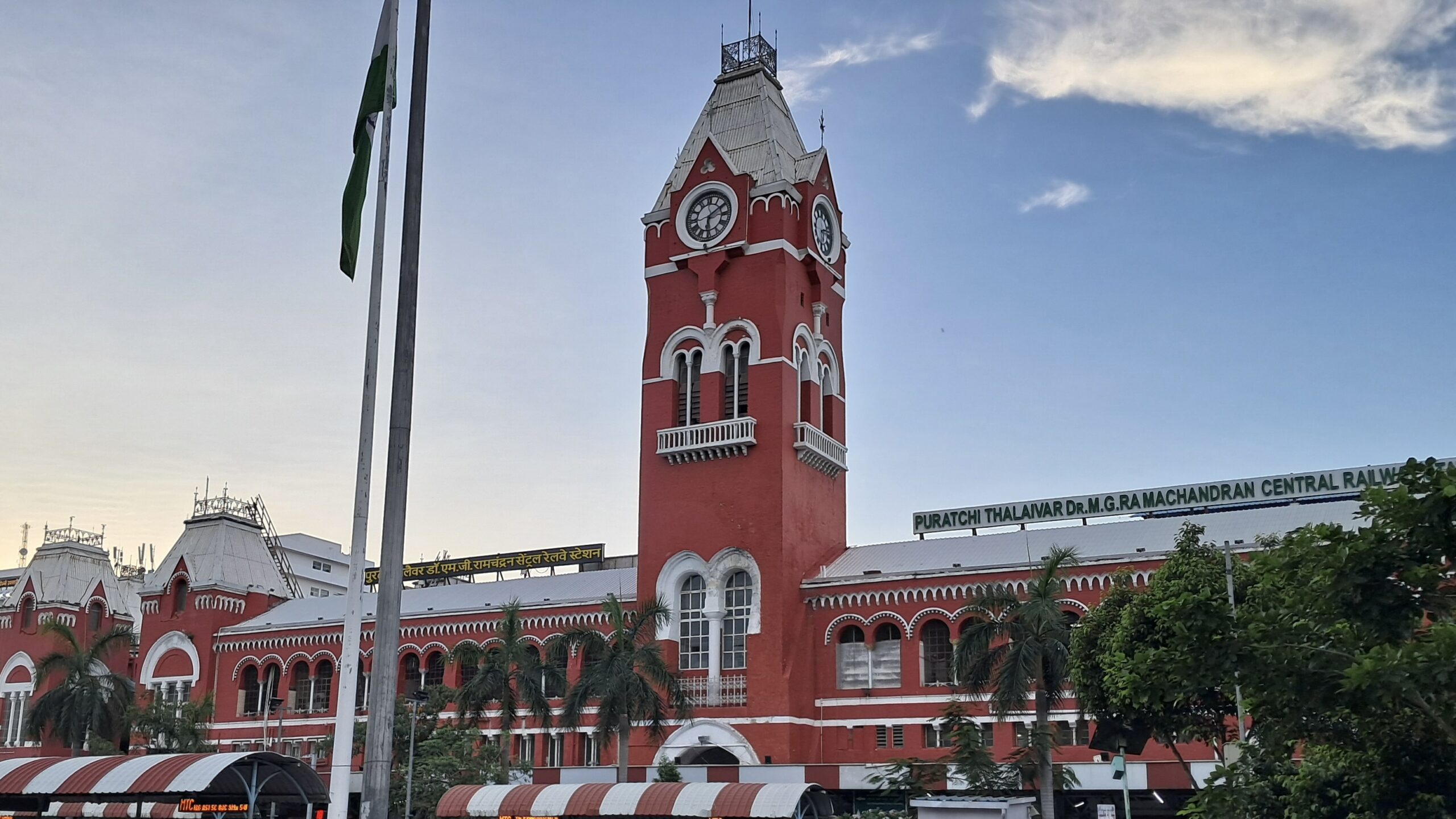Overcrowding continues to plague trains and stations, particularly during holidays and festive seasons. The unlimited issue of unreserved tickets often results in general coaches being packed far beyond safe limits, with incidents of passengers fainting or being forced into hazardous travel conditions.
Published Oct 06, 2025 | 5:30 PM ⚊ Updated Oct 06, 2025 | 5:30 PM

Central Railway Station, Chennai
Synopsis: Overcrowding has become a regular feature of train travel on Southern Railway, which carries an estimated 17 lakh passengers daily. Unless journeys are planned months in advance, passengers report struggling to secure reserved berths and having to endure unsafe conditions in overcrowded unreserved coaches. Adding to the difficulties are last-minute platform changes and limited direct services on key routes. Despite efforts to ease some of these problems, including special trains and ticket discounts during the festive season, passengers say such measures are inadequate against rising demand.
The Indian Railways, the largest railway network in the world by size, operations and workforce, carries tens of lakhs of people every day. Among its zones, the Southern Railway (SR), headquartered in Chennai and serving much of Tamil Nadu and Kerala, transported an estimated 17 lakh passengers daily in 2023–24.
Of this, SR’s vast suburban network alone accounts for about 8.6 lakh passengers, while another 3.4 lakh use its non-suburban services. In June this year, all 9-car suburban trains were upgraded to 12-car formations, increasing capacity by 21 percent and creating space for nearly 4 lakh additional commuters.
Despite the expansion, overcrowding continues to plague trains and stations, particularly during holidays and festive seasons. The unlimited issue of unreserved tickets often results in general coaches being packed far beyond safe limits, with incidents of passengers fainting or being forced into hazardous travel conditions.
Adding to the difficulties are last-minute changes in scheduled platforms. “My family and I were supposed to travel from Calicut to Chennai, but we missed our train because the website showed platform no. 1, and it was changed at the last minute to platform no. 4,” a passenger told South First.
“There are only three direct trains from Calicut to Chennai. Now that we missed one, the only option is to postpone our journey because the next train is at 3 am tomorrow. Even that will be overcrowded, and it’s not safe to travel in such jam-packed general compartments,” the passenger added.
Passengers say the challenge begins long before the journey itself. With routes between major southern cities in high demand, confirmed berths are often booked weeks in advance.
Those unable to plan so early are left with two options: pay more for Tatkal reservations or risk unsafe travel in overcrowded unreserved coaches.
“I work in Bengaluru, and to go back home I need to book tickets at least a month in advance. Otherwise, I either end up paying extra for premium reservations or not getting a ticket at all,” a corporate employee told South First.
“In my field, I can’t always confirm my leave that early, so planning train travel becomes almost impossible,” he added.
To ease the process, Southern Railway has begun preparing reservation charts eight hours before departure instead of the earlier four. Officials say this provides waitlisted passengers with greater clarity and time to explore alternatives.
While some welcomed the move, many argue that early charting does little to address the underlying shortage of trains and affordable berths.
For many, Reservation Against Cancellation (RAC) tickets remain a double-edged option. While they involve paying full fare for half a berth, they also offer a vital fallback on overcrowded routes. If a confirmed passenger cancels or fails to board, the berth goes to the RAC passenger with the lowest number, upgrading the journey from cramped to seated.
“At least we can reach our destination, even if we have to pay the full fare for just a half berth,” a passenger told South First.
But the feature is largely a stop gap that offers little value as passenger numbers continue to grow, leaving ordinary travellers grappling with uncertainty, overcrowding and rising costs.
Railway Minister Ashwini Vaishnaw on 23 September announced that over 12,000 special trains would operate across the country during the upcoming Deepavali and Chhath season.
“After discussions with senior public representatives, it was decided that over 12,000 special trains will be run for Deepavali and Chhath. At the same time, due care will be taken to ensure passengers face no difficulties during their return travel,” Vaishnaw said.
He also announced a 20 percent discount on return tickets for passengers travelling between 13–26 October and returning between 17 November–1 December.
In 2024, the South Central Railway (SCR) had operated 850 special trains during the Deepavali and Chhath season, compared to 620 the previous year.
To manage the rush, SCR deployed 60 Railway Protection Force personnel and 20 ticket-checking staff in shifts at Secunderabad station, according to Chief Public Relations Officer A Sridhar.
Additional booking counters, waiting halls, shelters and electronic display boards were set up, while intensified security checks led to the recovery of 64 lost items and the rescue of 54 children from trafficking, noted Senior Divisional Security Commissioner Debashmita Chattopadhyay.
Despite such measures, railway officials admit that during peak travel, passengers often have no choice but to board any available train bound for their destination.
